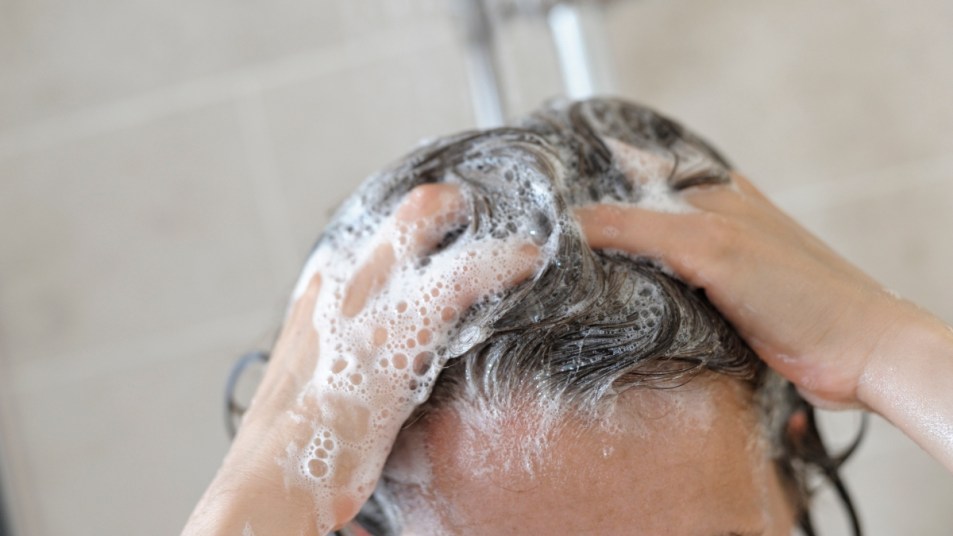These Common Ingredients in Your Shampoo Could Cause Hair Loss

When you lather up your hair in the shower, it always feels like you’re accomplishing something. It can be invigorating and relaxing at the same time — the creamy, foamy shampoo leaving you feeling refreshed and your scalp and roots squeaky clean. But if you’re using the wrong products, all that effort may be doing more harm than good. Unfortunately, there are certain ingredients in shampoo that can cause hair loss.
While it might feel like a pain to check the label before tossing shampoo in your shopping cart, it’s worth the extra minute. Knowing which ingredients may contribute to thinning hair and strand damage will empower you to choose natural and clean products.
What ingredients in shampoo make you lose your hair?
The chemicals you should avoid in your hair care include phthalates, parabens, certain preservatives, and ethanolamine compounds. Phthalates are used as gelling agents and fragrance boosters, while parabens and other preservatives prevent microbe growth in products. Ethanolamine compounds work as emulsifiers (to help create luxurious lathers) and pH adjusters (to preserve color in color-treated hair). Though these ingredients don’t sound harmful at first, all of them negatively affect the scalp, hair follicles, and hair strands.
Some hair specialists also believe that sodium lauryl sulfate and sodium laureth sulfate, two foaming agents, contribute to hair loss by stripping the hair and making it brittle. However, others believe that these ingredients benefit the hair if they are used just once or twice per week. (If you have dry, curly hair, use them less frequently.) Sulfates thoroughly cleanse the hair, they argue, and remove product buildup, which can clog hair follicles and lead to hair thinning.
Phthalates
Manufacturers often include phthalates in shampoos because they act as gelling agents. Gelling agents are thickeners that give shampoo its rich, smooth consistency and help keep the other ingredients together. Phthalates can also help the fragrance last longer. Unfortunately, they come with serious downsides.
“Phthalates are harmful to your hair and scalp health for multiple reasons, yet we come into contact with them on almost a daily basis,” says celebrity hairstylist Andrew Fitzsimons. “Phthalates are found in some of the biggest brand names on the market, so it’s important to be careful when selecting your hair care products … Under current law, manufacturers are not required to list phthalates on their product’s labels.”
But why does this ingredient negatively affect hair health? “Studies have shown that phthalates interfere with your endocrine hormones, which negatively affects your hair’s growth cycle,” says Fitzsimons.
“Using products that contain phthalates can lead to eczema, dandruff, and hair loss,” adds Annagjid “Kee” Taylor, a celebrity hairstylist, salon owner, and founder of Shear Genius Haircare. “Phthalates are not doing any favors to your hair or body and should be avoided. But unfortunately, not all products properly disclose the presence of phthalates — so it’s important for consumers to properly research the products they’re purchasing and using.
Parabens and Ethanolamine Compounds
The beauty industry has used parabens and other synthetic preservatives to increase product shelf life since the 1920s. Even though preservatives reduce bacteria and mold growth, they can irritate the skin and disrupt hormones in the body. Both side effects can lead to hair loss.
Ingredients like DEA and TEA are linked to similar problems. DEA (diethanolamine) and TEA (triethanolamine) are ethanolamine compounds that create a thick lather and balance the pH of shampoo. Unfortunately, they often cause scalp irritation which can lead to hair thinning. They can also damage keratin, the main protein in your hair strands.
Taylor and Fitzsimons both note that DEA and TEA may cause other health problems. “Overexposure to these compounds can lead to cancers and organ system toxicity. The constant interaction with different chemicals can become carcinogenic,” says Taylor.
“While not the case in the United States, The European Commission actually prohibits diethanolamine (DEA) in cosmetic products as a result of concerns surrounding the formation of carcinogenic nitrosamines that can induce cancer,” Fitzsimons adds. “I recommend always reading the labels on your cosmetic, haircare, and personal care products, and do your best to avoid those with DEA and TEA.
List of Ingredients in Shampoo That Cause Hair Loss
To figure out which ingredients on your shampoo bottles are harmful, check out this list of common chemical names.
- Phthalates: DCP (dibutyl phthalates), DMP (dimethyl phthalate), DEP (diethyl phthalate), DEHP (Di(2-ethylhexyl)phthalate), BzBP (benzylbutyl phthalate), DBP (dibutyl phthalate), DNOP (di-n-octyl phthalate), DiNP (diisononyl phthalate), DiDP (diisodecyl phthalate), DnHP (di-n-hexyl phthalate)
- Parabens: Methylparaben, propylparaben, butylparaben, ethylparaben, and alkyl parahydroxybenzoates.
- Other preservatives: Methylisothiazolinone, DMDM Hydantoin (a formaldehyde releaser)
- DEA (diethanolamine) and TEA (triethanolamine)
If you’ll have a hard time remembering these names the next time you go shopping (we don’t blame you!), use the EWG’s Skin Deep Database. Simply enter the product name into the database to check it for harmful ingredients.
It’s also important to note that many factors can contribute to hair loss, including aging and a high-fat diet. Consult with a health care professional if you believe other issues are worsening your hair loss. Still, eliminating these ingredients from your hair care routine may help you achieve healthy, strong, and thick hair.












